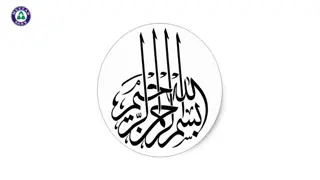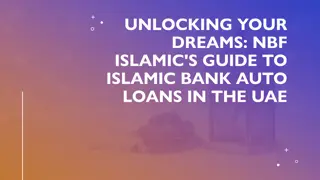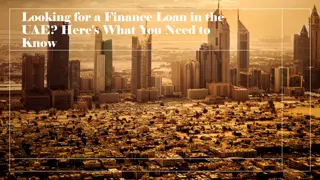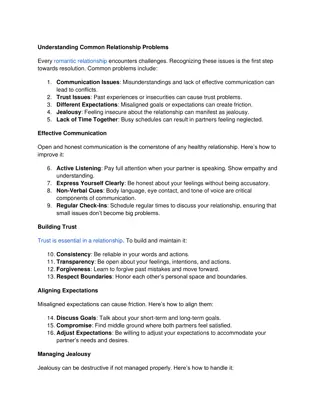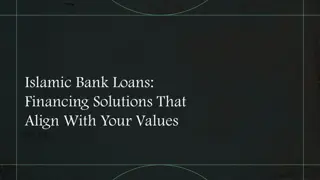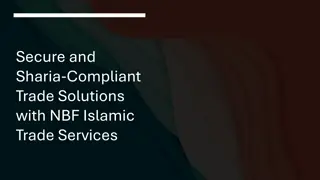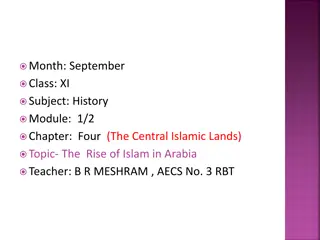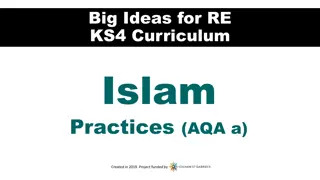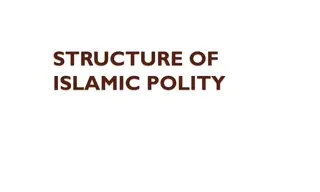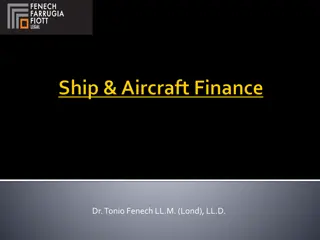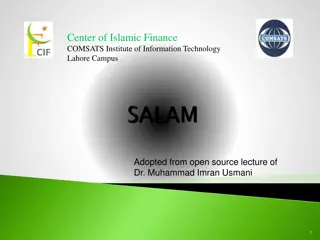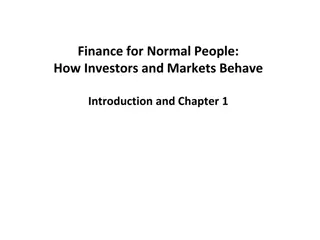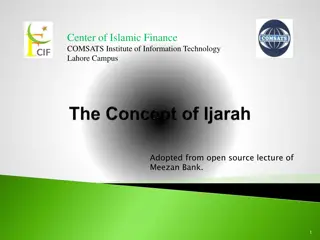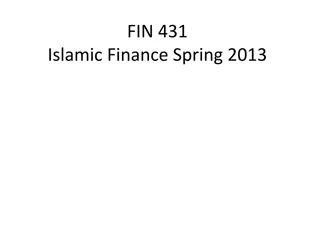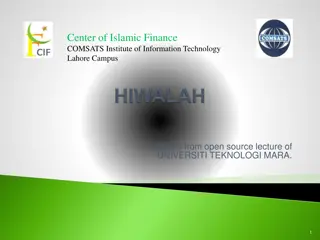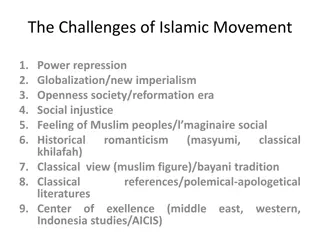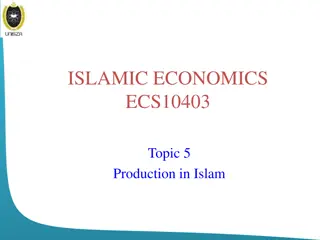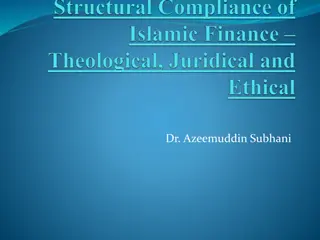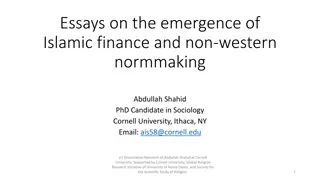Evolution and Growth of Islamic Finance Industry in Africa
The Islamic Finance industry has witnessed significant evolution and growth since 1960, with the emergence of Islamic Financial Institutions (IFIs) in both Muslim-majority and Muslim-minority countries. The sector has seen a rise in assets, global market share, and the establishment of Islamic Credit Unions to meet community needs. Challenges such as mimicking conventional products and ensuring economic justice remain, but there is a push towards Shari'ah-compliant development. Different models within the industry, such as Islamic Microfinance and Sukuk, play key roles in shaping the landscape of Islamic finance.
Download Presentation

Please find below an Image/Link to download the presentation.
The content on the website is provided AS IS for your information and personal use only. It may not be sold, licensed, or shared on other websites without obtaining consent from the author. Download presentation by click this link. If you encounter any issues during the download, it is possible that the publisher has removed the file from their server.
E N D
Presentation Transcript
AL BARAKAH MULTI-PURPOSE CO-OPERATIVE SOCIETY LIMITED H.O.: Madam Lolo Street, Rose Belle, Mauritius Tel: (+230) 6275766 E-mail: albarakahcoop@yahoo.com; www.albarakahcoop.org ISLAMIC CREDIT UNION - AN INCLUSIVE FINANCIAL INSTITUTION TO MEET THE NEEDS OF THE COMMUNITIES IN AFRICA 5th African Islamic Finance Summit 17 18 April 2018 Tanzania
Agenda Introduction: The Islamic Finance industry The Cooperative Movement & Credit Unions Credit Unions Worldwide The Credit Union Movement and Islamic Financial Institutions Islamic Credit Unions Setting up Islamic Credit Unions Financing Instruments of Islamic Credit Unions Reserves and other Funds of Islamic Credit Unions Challenges Conclusion
The Islamic Finance Industry Evolution and Growth The modern experiment of profit and risk-sharing business, which is the cornerstone of Islamic banking business, first undertaken in 1963 in Mit Ghamr, had as purpose the exploration and investigation of the possibilities of mobilizing local savings and credits as an essential requirement for socioeconomic development in the area. (El Naggar, 2006).
The Islamic Finance Industry Evolution and Growth Emergence of IFIs since 1960 & growth - IBFI - a reality in Muslim majority as well as Muslim-minority countries and its share in the global market is increasing day by day. Observation satisfaction: growth, IFIs, Islamic windows; Global IF Assets = $2 trillion at year-end 2016; > 50 IFIs in Africa out of 600 institutions globally (MIFC, 2017) Critics: mimicking the conventional products - whether IFI are achieving the Islamic ideals of economic justice, providing necessities of life and well-being of the community, good life and spiritual peace are available to society at large encouraging consumerism IFI to mobilise resources to promote development in a Shari ah-compliant manner.
The Islamic Finance Industry Islamic Financial Institutions B.Model - Types of IFI: F-B-T-L- FH Dominance by ICB (HNW) & neglected areas like Islamic microfinance & institutions/ Model like cooperatives which are - CBO and have economic as well as social objectives. Experiment of Dr. Naggar of mobilizing savings and credits for socio-economic development Back --- IBF evolved through the cooperative sector - acted as a stepping stone Segments of Islamic Finance Industry Islamic Microfinance 1% Takaful 1% Others 4% Islamic Funds 4% Sukuk 15% Islamic Banking Assets 75%
The Cooperative Movement & Credit Union Idea of helping each other / joint efforts to achieve a common goal Rockdale Pioneers 1844 On 24th October 1844, in Rockdale, Lancashire, England, a group of people faced with economic exploitation and deprivation set up a cooperative store based on the principles of self-help and mutual help. They defined a set of principles which became the basis for the cooperative ideology which soon spread all over the world. Cooperative Bank in Germany In 1852, Franz Hermann Schulze-Delitzsch set up a Cooperative bank in Germany and Friedrich Wilhelm Raiffeisen developed the movement further (Moody and Fite, 1984). 1852 Further Developments 1888 to date By the time of Raiffeisen's death in 1888, credit unions had spread to Italy, France, the Netherlands, Austria, and to many other nations. The Cooperative Movement has spread all over the world be it a capitalist, socialist or Muslim society
The Cooperative Movement & Credit Union an autonomous association of persons united voluntarily to meet their common economic, social and cultural needs and aspirations through a jointly owned and democratically controlled enterprise. Bodies: ICA represents 306 co- operative federations and organisations in 105 countries (Nov 2017). Main objective of establishing cooperatives is the promotion of the economic, social and cultural welfare of its members according to cooperative principles. Business activity : consumer, producer, marketing, agriculture, fishing, housing cooperatives, financial cooperatives - Credit Unions PRINCIPLES Voluntary and open membership Democratic member control Member economic control Autonomy and independence Education, training and information Co-operation among co-operatives Concern for community Source: International Cooperative Alliance (ICA)
Credit Unions A credit union is a particular form of cooperative bank. Specifically, a credit union is a not-for-profit cooperative financial institution that is owned and controlled by its members and operated for the purpose of promoting thrift, providing credit at reasonable rates, and providing other financial services to its members. Africa Afghanistan SACCOS (Savings and Credit Cooperative Societies) Credit Unions Indonesia Islamic Investment and Finance Cooperatives (IIFCs) Egypt Bait ul Maal wat Tamweel (BMTs) Savings and Credit Association known as the Gam iya Throughout history the model has proved that it is one that may be adapted to the needs of different population groups, different cultures, languages, and religions, as well as to different legal, political, and economic systems.
Credit Unions Worldwide WOCCU Statistical Report 2016 ** Penetration rate is calculated by dividing the total number of reported credit union members by the economically active population age 15-64 years old.
CU in Africa: 25 countries, CU - 21724, Members - 23,248,774 SADC ( 14C ) , COMESA (19C)
Credit Unions / Financial Cooperatives Core Features Membership People from all walks of life Common bond (place of work, same organization, community- based) Ownership: member-owned organization Democratic OMO Vote Capital - Financial dignity - shares, savings and deposits from members Financing - savings precedes financing spirit of savings, multiplier (1x3) No maximization of profit/Satisficing concept Surplus/profit returned to shareholders in terms of dividend, patronage bonus, lower fees, reserves and better services
Islamic Credit Unions / Islamic Financial Cooperatives ICU refers to retail financial services in compliance with Islamic financing principles. Islamic Credit Unionists efforts on several fronts over the past 50 years to promote and set up ICU around the globe. UK alone has 22 fully fledged Islamic Investment and Finance Cooperatives (IIFCs) (WOCCU, 2013). During the past years, WOCCU has built a network of Islamic Investment and Finance Cooperatives across Afghanistan providing Murabaha, Ijara and other products to these member-owned cooperatives.
Islamic Credit Unions Tracing History India 1890 Efforts in the organized sector under the style of the Patni Cooperative Credit Society was established in 1942, almost immediately after the adoption of the Indian cooperative Act 1940 (Dr. Rahmatullah- IFFI of India in crisis/Bagsiraj-IFII, published by KAU, Jeddah-2003) Egypt and Pakistan 1960 Formal Islamic banking first emerged in the early 1960 s through credit unions of Muslim landowners in Egypt and Pakistan who simply pooled their resources and could then in turn draw out funds for agricultural improvements on a non-interest basis. (Prof Rodney Wilson) 1980 - 1982 During the period 1980-1982, Alhaji Saiyadi Ringim, Chairman of NASCUN (the Nigerian credit union federation) and also Chairman of ACCOSCA (the Panafrican credit union confederation) undertook a mission to Cairo, Egypt whereby he consulted Islamic scholars about the application of Islamic law to economics and finance and about the feasibility of credit unions in Muslim societies (Alhaji, 1982). Thailand 1987 History of Islamic Financial system in Thailand started with the establishment of a cooperative society, Pattani Islamic Saving Cooperative that operates based on Shari ah in 1987 (Haron & Yamirudeng) India 2003 Study shows that there are institutions that have grown to a size of 14 Islamic Cooperative Credit Society (ICCS) in India. Bagsiraj, 2003 T & T , 2006 2006 I.ALI , Founder of Muslim Credit Union Co-operative Society Ltd, Trinidad & Tobago, submitted a concept paper to the IDB, Jeddah, Saudi Arabia as an initiative to the promotion of Islamic finance through the cooperative and credit union system.
Islamic Credit Unions in Muslim-majority & Muslim-minority Countries Credit Union Koperasi Muslimin Malaysia Berhad Ansar and Islamic Co-operative Housing Corporation (ACHC) Muslim Credit operative Society Limited Pattani Islamic Cooperative Muslim Community operative Limited Country Malaysia Year 1980 Main Products / Remarks Bai Bithaman Aajil; Muslim Welfare Scheme (Al-Abrar); Qard Hassan Interest-free home ownership opportunities Canada 1981 and investment Ltd. Union Co- Trinidad Tobago Thailand & 1983 NA Saving 1987 NA Co- Australia 1989 Facilitated over $750 million in Islamic home finance and manages close to $30 million in investments. Qurtuba Housing Co-op Quebec, Canada 1991 Musharaka house financing Loans and Savings Abertawe (LASA) Credit Union Ltd Swansea, Great Britain 1992 Conventional credit union offering Shari ah compliant savings and finance products to its members (Hajj Fund, Marriage Fund; Funeral Fund, Murabaha and Wakala) Ameen Housing Co-operative of California, Inc. (AHC) Islamic Co-operative Finance Limited California 1996 Investments and home financing Australia 1998 Housing and vehicle finance; Hajj fund; Qard Hasan (Benevolent) fund; Children Education fund; small business finance; finance for other household goods Murabahah; Istisna; Ijara, Qard Hasan; Hajj Savings Account; Cooperative Solidarity Fund/ Micro Takaful Al Barakah Multi-purpose Co- operative Society Limited Mauritius 1998
Islamic Credit Unions in Muslim-majority & Muslim-minority Countries Credit Union Country Year Main Products / Remarks Takaful T&T Friendly Society Trinidad Tobago & 1999 Funeral Benefit; Hajj Fund; Investment Fund; Waqf (Cash Waqf, Real Estate Waqf); Property Ownership NA FML Society Balkh Savings and Credit Union Multi-Purpose Co-operative Fiji Islands 2004 Mazar-e-Sharif, Afghanistan 2004 NA Jawsjan Savings and Credit Union Sheberghan, Afghanistan Trinidad Tobago Thailand Hong Kong 2004 NA Manzil Co-operative & 2006 NA Al Islamiah Saving Cooperative Amwal Credit Union NA 2009 NA Ijarah; Wakalah; and a variety of accounts and wealth management services Various types of Demand and Term Deposits Accounts; Murabaha; Mudaraba; Musharaka; Ijarah and many others First bank to offer Islamic mortgage services exclusively at one of ACU s branches http://www.icucan.ca/home Murabaha; Istisna'a; Musharakah; Janseva Cooperative Credit Society Limited India 2010 Assiniboine Credit Union (ACU) Winnipeg, Canada Canada 2010 Islamic Credit Union of Canada (ICUC) NA NA: Not Available Source: Computed
Setting up Islamic Credit Unions Conceptual Framework Cooperate with all in what is good and pious and do not cooperate in what is sinful and wicked (Q-5:2) -Ta awoun Legal Framework Easy formation, less regulated than other corporate sector (Cooperatives Act ,Credit Union Act); Shari'ah- compliant - WOCCU Values-based model -IF based on Islamic ethics/values: justice, sharing, solidarity Coop based on values: honesty, equity, solidarity, self-help, mutual-help etc. Common bond - IB CBO / Member-owned organization Small seed capital SVG Incentives & Benefits Tax Relief Multi-purpose - open to various types of economic activity Broaden ownership of business Reduce concentration of wealth Democratisation of the Islamic Financial System (SMF Inst.)
Islamic Credit Unions Formation & Organization Founder members -Initial contribution of those who are conscientious and committed people to provide an alternative to the interest-based institution Democratic Structure / Management / Board & Sub-committees Shareholdings / Membership / Financial inclusion / Returns Open to people from all walks of life, established by the people, for the people CBO - Member-owned society where the spirit of ownership and sense of belonging to an Islamic financial institution will be present. Financial dignity by mobilizing community/members - shares, savings and deposits and offering financial services to those who lack access to financial services Not-for-profit-maximization - reasonable profit on financing products Returns to shareholders/members Organs of Control, Audit & Good Governance AGM - Internal Controller, External Auditor and Shari ah Supervisory Committee to ensure that the affairs of the institution are conducted in accordance with Shari ah and within provisions of the Law of the country capital/funds from the
Islamic Credit Unions Marketing Lack of awareness of Islamic finance. Correcting misconceptions about ICU - not a charitable institution or a benevolent society but a business organization operating on Islamic lines for the community. Word-of-mouth marketing Education & Training/ Human Resource Islamic Finance Education Program (IFEP) for existing and potential members Topics and aspects such as Conceptual Framework of IF, Basic Islamic Financial Laws, Quranic Verses concerning the economic system of Islam, Ethics and operation of the ICU. Weekly/Fortnightly education sessions for members and their beneficiaries/dependents/sureties Location - Inception stage - Mosques, Islamic educational institutions, and centers can be used for these activities.
Islamic Credit Unions Financing Instruments Reserves and Other Funds Murabahah (Cost- plus financing) Statutory Reserve Ijarah (Leasing) Istisnah (Construction Finance) Dividend Equalisation Fund Salam (Forward purchase of a commodity) Mudarabah (Passive Partnership) Profit Equalisation Reserve Musharakah (Joint venture) Musharakah Mutanaqisa (Diminishing Musharakah) Takaful Ta awuni Fund Qard- (Interest-free loan) Zakah Fund
Challenges Individual Level: Change in the mindset of individuals to perceive and appraise Islamic finance from an Islamic perspective rather than looking from conventional binoculars. Organizational Level: Orgcan play a key role towards the promotion of ICU - setting up their own ICU or be fervent supporters of such institutions. Community Level: Whole community will benefit if they take the initiative to bring about the desired change as Allah says: Indeed, Allah will not change the condition of a people until they change what is in themselves (Ar-Ra`d 13:11) People have to learn to live a modest and balanced material and spiritual lifestyle/good life (Hayat tayyiba) to attain success (falah).
Challenges at various levels Government/Regulators Level -Must support community-level financial institutions by providing a favorable legal framework, and tax incentives . Global Level - Prevalence of ICU globally, need for international bodies such as AAOIFI, ISRA, IFSB and IDB to at least establish a special unit or department for development of this sector. - WOCCU - Established Islamic Investment and Finance Cooperatives in Afghanistan (2004 2012) and now shifting its attention to Libya.
Conclusion ICU is in line with both cooperative and Islamic principles. Financial services to all strata of the community and opportunities of managing the wealth of the community in a Shari ah compliant manner. Enlighten members - Not to be interested only with the economic benefits of the institution but also with the spiritual and conceptual part Prepared to face challenges, inconveniences or difficulties that will be unavoidable at the infant stage of the institution. Concern for community - ICU can embark everyone on board as a stakeholder -job of everybody .
AN INCLUSIVE FINANCIAL INSTITUTION TO MEET THE NEEDS OF THE COMMUNITY ISLAMIC CREDIT UNION Mr. Mamode Raffick NABEE MOHOMED Founder & Secretary AL BARAKAH MCSL E-mail: albarakahcoop@yahoo.com rafficknm@yahoo.com www.albarakahcoop.org Tel: (+230) 6275766, Mb. (+230) 57781738



